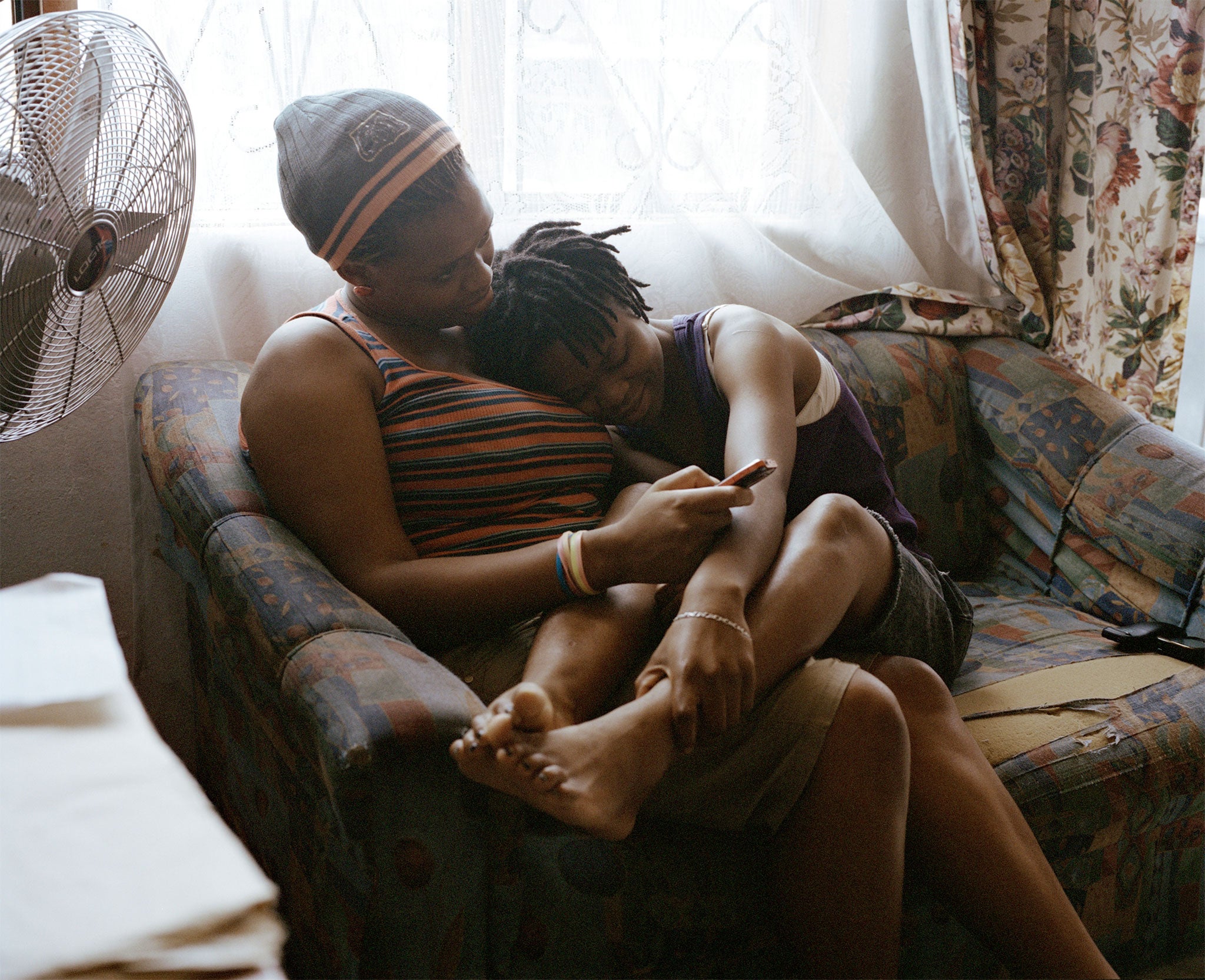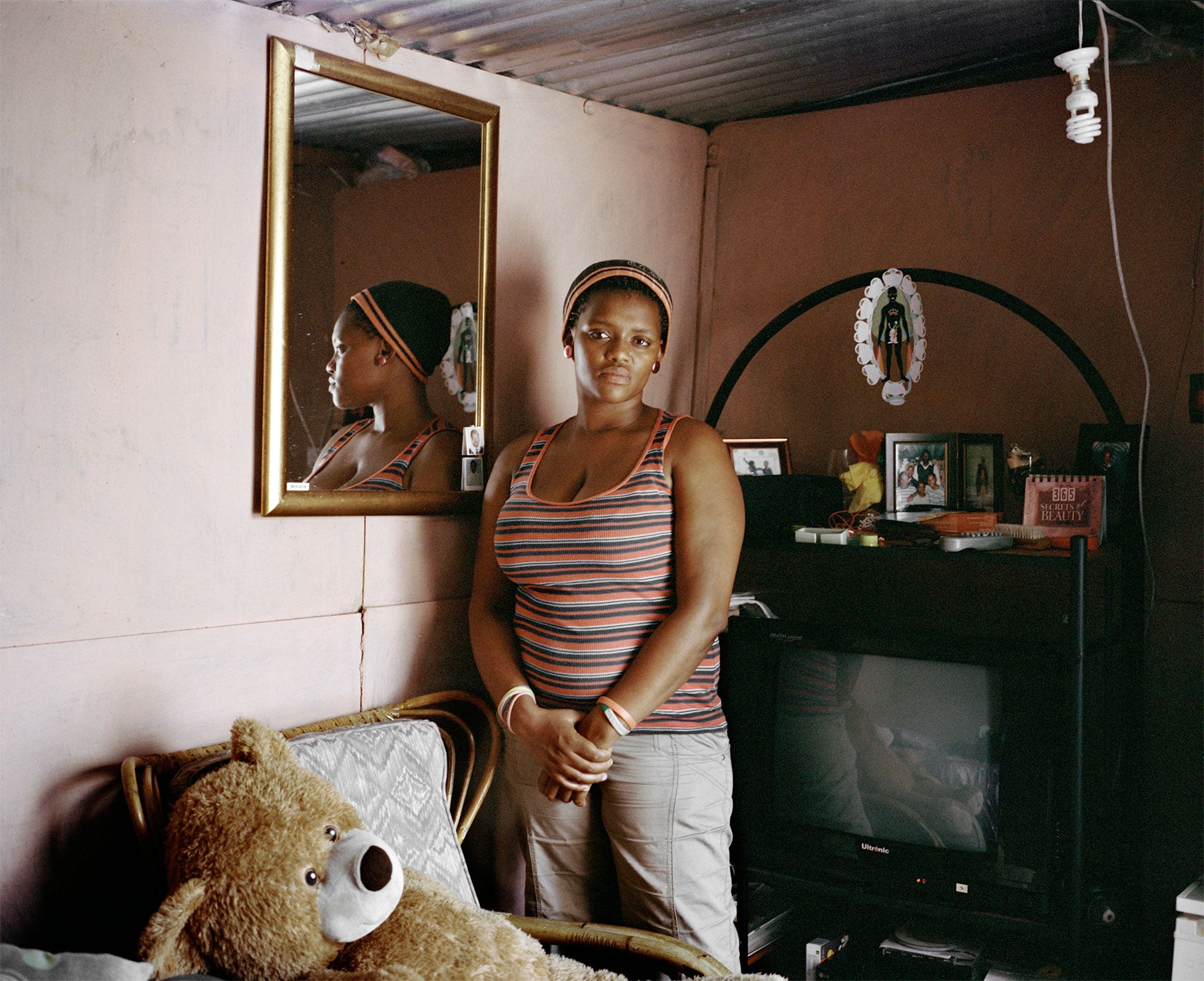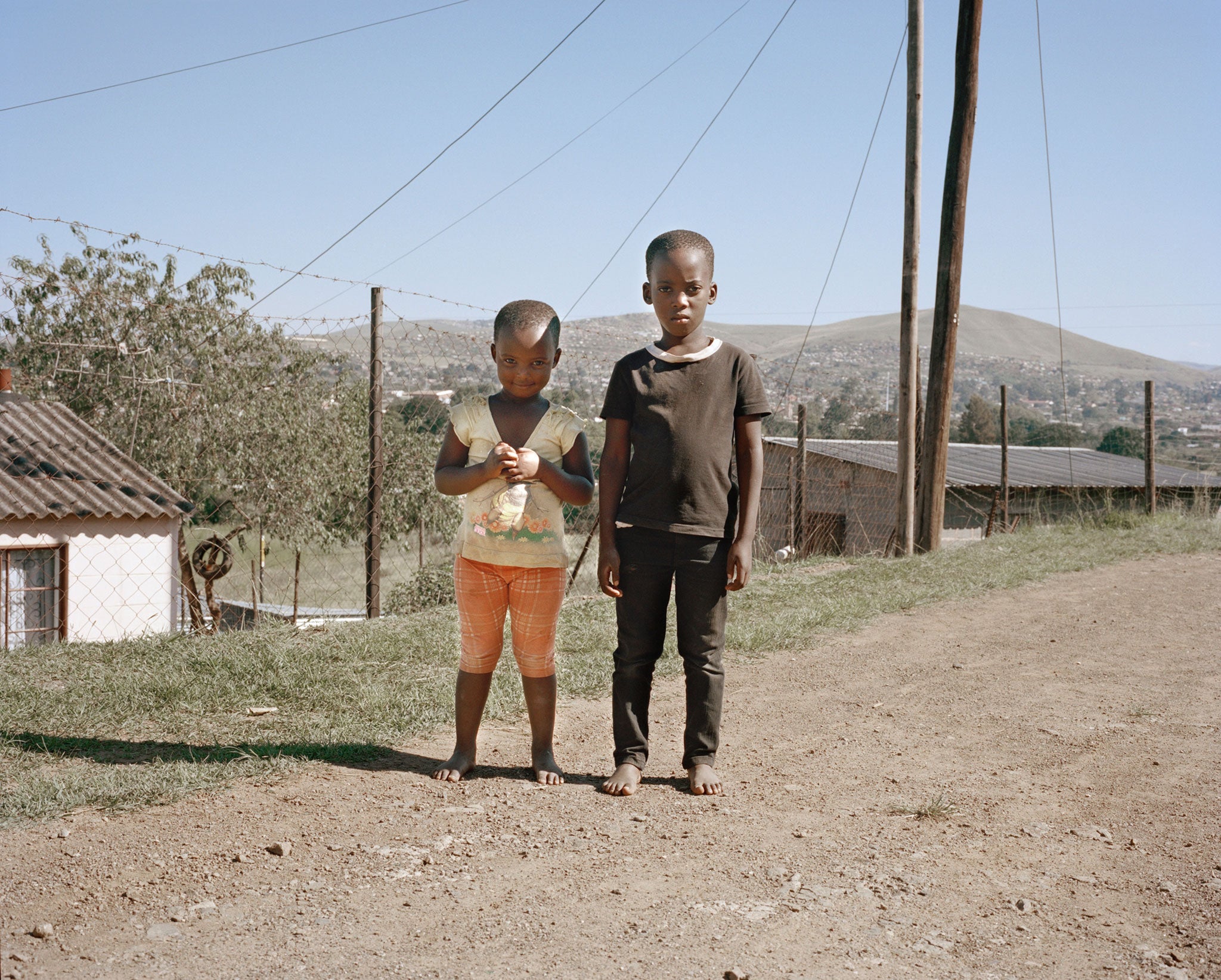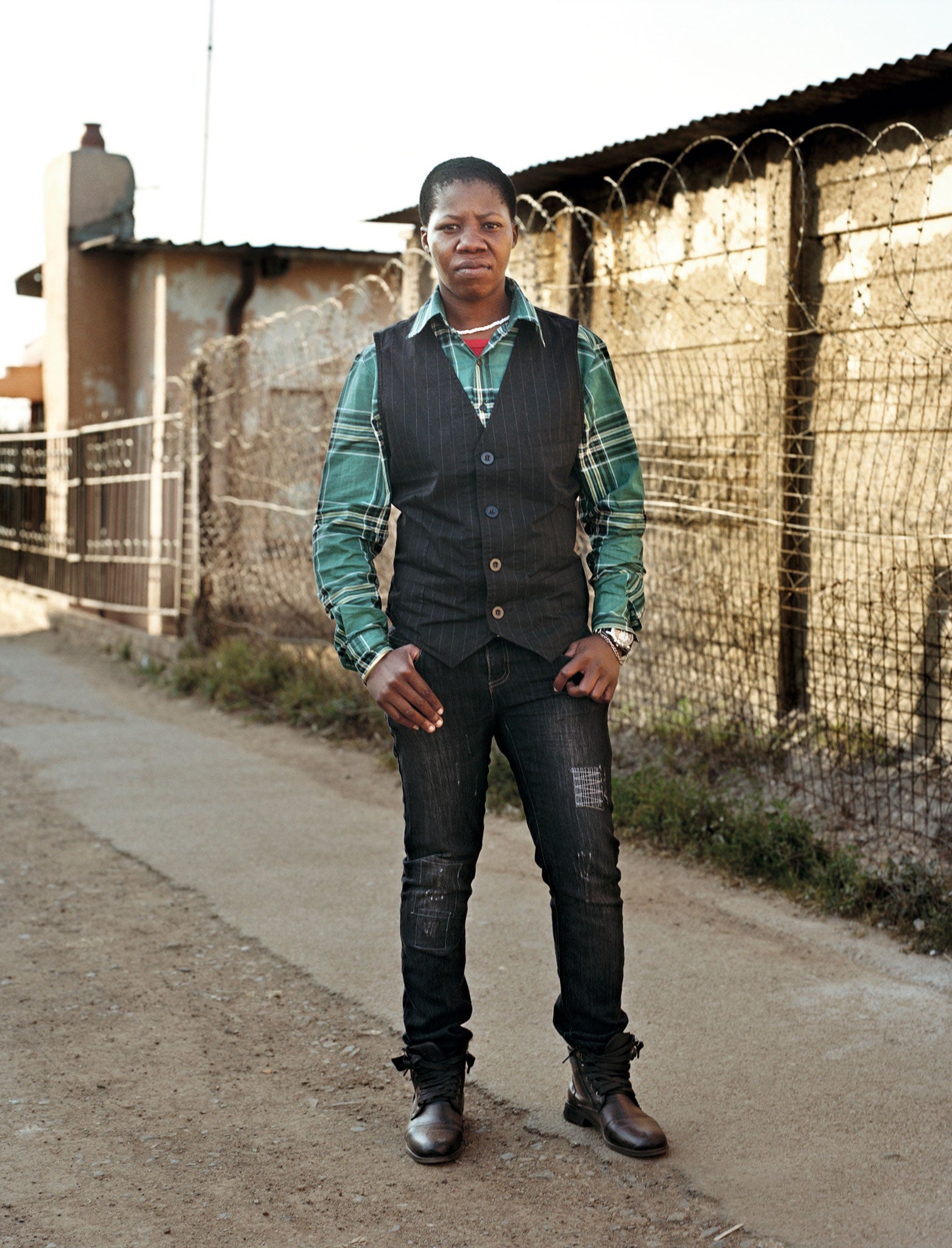Crisis in South Africa: The shocking practice of 'corrective rape' - aimed at 'curing' lesbians
Clare Carter travelled across South Africa to photograph and interview the victims of this appalling crime. These are their stories...

Your support helps us to tell the story
From reproductive rights to climate change to Big Tech, The Independent is on the ground when the story is developing. Whether it's investigating the financials of Elon Musk's pro-Trump PAC or producing our latest documentary, 'The A Word', which shines a light on the American women fighting for reproductive rights, we know how important it is to parse out the facts from the messaging.
At such a critical moment in US history, we need reporters on the ground. Your donation allows us to keep sending journalists to speak to both sides of the story.
The Independent is trusted by Americans across the entire political spectrum. And unlike many other quality news outlets, we choose not to lock Americans out of our reporting and analysis with paywalls. We believe quality journalism should be available to everyone, paid for by those who can afford it.
Your support makes all the difference.Mvuleni Fana was walking down a quiet alleyway in Springs – 30 miles east of Johannesburg – on her way home from football practice one evening when four men surrounded her and dragged her back to the football stadium. She recognised her attackers. One by one, the men raped her, beating her unconscious and leaving her for dead.
The next morning, Mvuleni came round, bleeding, battered, in shock, and taunted by one overriding memory – the last thing they said to her before she passed out: "After everything we're going to do to you, you're going to be a real woman, and you're never going to act like this again".
Corrective rape is a hate crime wielded to convert lesbians to heterosexuality – an attempt to 'cure' them of being gay. The term was coined in South Africa in the early 2000s when charity workers first noticed an influx of such attacks. But despite recognition and international coverage, corrective rape in the region is escalating in severity, according to Clare Carter, the photographer behind these images. This is amid a backdrop of parts of the country "becoming more homophobic", as one recent victim asserts.
Compared to many of South Africa's victims, Mvuleni was lucky: she survived. At least 31 women in the past 15 years did not. In 2007, to cite one incident, Sizakele Sigasa, a women's and gay rights activist, and her friend Salone Massooa, were outside a bar when a group of men started heckling and calling them tomboys. The women were gang raped, tortured, tied up with their underwear and shot in the head. Executed. No one was ever convicted.
Mvuleni's case was also unusual as, unlike 24 out of 25 rapes that even reach trial in South Africa, two of her attackers were convicted and imprisoned for 25 years. The others remain at large.
Ever since a 1998-2000 report by the United Nations Office on Crime and Drugs ranked South Africa as highest for rapes per capita, it has repeatedly been described as the rape capital of the world: 500,000 rapes a year; one every 17 seconds; one in every two women will be raped in her lifetime. Twenty per cent of men say the victim "asked for it", according to a survey by the anti-violence NGO, CIET. A quarter of men in the Eastern Cape Provinces, when asked anonymously by the Medical Research Council, admitted to raping at least once – three quarters of whom said their victim was under 20, a tenth said under 10. A quarter of schoolboys in Soweto described "jackrolling" – the local term for gang rape – as "fun".
Although statistics for corrective rape have not been compiled nationally, one support group in Cape Town told ActionAid researchers in 2009 they deal with 10 new cases every week.
Clare Carter left her home in New York City in 2011 to photograph South Africa's corrective rape victims. Horrified at the magnitude of the problem, she spent two years there, finding those affected and gaining their trust. In total, Carter photographed 45 survivors, hearing their stories and piecing together the mosaic forces fuelling the crime by interviewing priests and NGO workers, gay rights activists and family members. She also met with rapists. Carter's investigation – the most comprehensive of its kind – brought her right across the country, zigzagging from Durban and Johannesburg to Cape Town and Port Elizabeth, from some of the smartened-up townships replete with tourist-pleasing government housing, to shack-stuffed rural sprawls.
"Even in the two years I was there the stories I was hearing were getting worse," she says. "Corrective rape is getting more violent."
Indeed, when we meet in London, Carter produces transcripts of interviews with the survivors she photographed, which more often than not refer to knives, stones and sticks being used. One woman describes being anally raped by a gang brandishing a broom handle.
There is one testimony in particular that stands out, from a young woman called Pearl Mali. Carter was introduced to her by Funeka Soldaat, who runs Free Gender, an LGBT rights organisation that specialises in helping victims of corrective rapes. Free Gender have "no phone, no computer, no money, no counsellors, nothing, except Funeka's house". Pearl is now 21 and volunteers there. She was 12 when it happened.
Her mother suspected Pearl might be a lesbian as she was a "tomboy" and so one day her mother returned home from church with an "old man". Pearl doesn't know what conversation had taken place, only that "there was money involved". Her mother told her to go to her room.
"She said if I don't do what is right I won't get my lunch tomorrow."
The man entered her bedroom.
"He locked my door and I was in my pyjamas about to get in bed and he told me how beautiful I was, how fast I am growing."
He said he was going to sleep there with her, and started slapping Pearl, who screamed, bringing her mother to the door.
"She said, 'Pearl you are making noise, shut up'. He told me to take off my clothes and I refused. He beat me – I was fighting him but he overpowered me and raped me."
The next morning, Pearl's mother acted normally, and soon after asked him to move in. For the next four years he regularly raped Pearl, as her de-facto husband, to make her straight. She tried going to the police, but they started "laughing" when she said the most recent rape was last week. They expect women to come immediately.

Pearl became pregnant by him at 16, prompting her to go to the police again, who this time imposed a restraining order against the man. But days after giving birth, her abuser came to the house while she was alone with the baby.
"He wanted to touch me again so I was fighting and fighting [him]. He kicked me on my waist and all the stitches got loose." Though she successfully fought him off, Pearl's troubles soon spiralled.
"My mum and this guy took the baby away when he was seven months old because I was still a lesbian."
Her mother believed that if Pearl touched and fed the boy "it will make him gay". Pearl moved out and went to court to gain access, but three years later, she is still trying to win custody and is currently only allowed to visit her son at weekends.
"I used to sleep under a bridge, not eat, just cry. I hanged myself; it was on a Monday. I took pills, took alcohol, drank cleaning appliances and then hanged myself. But God said, 'It is not your time'."
Familial collusion in corrective rape is common, according to Carter. Simphiwe Thandeka, from Pietermaritzburg (the capital city of the conservative, fervently Christian province of KwaZulu-Natal) was 13, and a "tomboy", when a male relation started asking, "Why do you dress like this?". He raped her in bed one night, putting a pillowcase over her mouth.
"He told me to keep quiet. At the time I didn't know it was rape."
When she told her mother the next day – because she was bleeding heavily – her mother replied that it is a "family matter", and neglected to tell Simphiwe that the man is HIV positive. Simphiwe only discovered she had contracted the virus – a common outcome for such victims – three years later when she became pregnant by the man's friend, whom he had tried to marry her off to in a final attempt to "correct" her sexuality. After repeatedly raping and beating her with a coat hanger, the friend sent Simphiwe back to her uncle, realising she would never be heterosexual and they would therefore never "get on".
Soon, however, she was pregnant. She called her baby Happiness.

Now a mother, a local man told a friend of Simphiwe's that he was attracted to her, but the friend informed him that she liked women.
"He told her, 'I'll prove this girl is not a man, but is a girl'. I was scared. He came to my home, he said he wanted to apologise for what he told my friend, but then he blocked me with his hand. He raped me in the dining room."
This time she went to the police but "they take his side... so nothing I can say or do". She called her second child Blessing.
Of all the countries in the continent, South Africa should be the least likely to be tarnished by homophobic hate crimes. Its 1997 constitution was the first in the world to secure the equal rights of LGBT people and a flurry of laws followed preventing workplace discrimination and, in 2005, allowing gay marriage.
"The constitution is there but it doesn't mean anything to anyone," says Funeka, who founded Free Gender after being correctively gang raped and stabbed multiple times ("My body was there, but I was far, far away," she says).
"Even if you know how the constitution works, you don't know how to use it to protect yourself. If you don't have money you don't have access to the justice system. Violence in the townships is normal. Homosexuality is [seen as] un-African. Patriarchy is everywhere. The way religious leaders read scripture is painful. Children start raping at 14, 15 and take pictures. We're sitting on a time bomb."
One such religious leader is Reverend Oscar Peter Bougardt, a senior pastor in the Mitchell's Plain township, 20 miles from Cape Town. "Homosexuals can change," he told Carter. "Homosexuality is a curse... a wicked influence... they come after our young people. Any clergy or priest that approves [of] homosexuality is from the pit of hell."
David Hessey, who works for the Gay and Lesbian Association, also blames the courts for failing to deal with corrective rape cases.
"It is not treated as a serious offence. We are awaiting the sentencing of a corrective rape case – a father raped his daughter's girlfriend to 'cure' her and he has been convicted – but it took two years to get the case to court and this is fast for South Africa. Most take six years which is why most people don't report it."
Witnesses are often disregarded in court, as even seeing and hearing a victim screaming is deemed "hearsay, as the woman may be screaming in pleasure and this may be the way they like having sex".
The police routinely have neither the resources nor inclination to investigate. Leonie Spalding, aged 37, says when she came out to her husband he correctively raped her, but the police officer on duty was a friend of her husband's who took her home, asked the husband what happened, to which he replied he was "just doing what any man should do and show me my place as a woman". No charge was brought. In the testimonies collected by Carter, the most common reaction from police to corrective rape is laughter. But she cites a litany of causes for the phenomenon.

"A lot of people are outraged that gay people have equal rights, and are becoming more angry as gay people become more visible," she says. "It's a deeply patriarchal country – men are numero uno in the townships – and use corrective rape as a tool to assert their masculinity, all while egging each other on. Combine that with a lack of education, high unemployment leading to mass boredom, frustration and problems with drink and drugs and you have a perfect storm for patriarchal sadism. And because the police and courts do nothing there's no consequence to corrective rape, which normalises it. It's not seen as a big thing."
Many have argued that the shadow cast by apartheid has a part to play, but it would be wrong to suggest that corrective rape is only South Africa's scourge. I also speak to three women seeking asylum in Britain to hear their stories.
Patricia, aged 40, fled Nigeria after "one of the guys in my area raped me to make me straight. I told my family, and he admitted it, but they didn't do anything because they didn't want to bring any shame on the family".
Belinda, aged 48, left Jamaica after being targeted for her sexuality.
"My brother belonged to a gang and he heard that they were going to rape me," she tells me. "One morning I was on my way to work and a guy tried to hold on to me and rape me. I managed to fight my way off knowing full well I couldn't report it to the police."
Lillian, aged 26, from the Republic of Cabinda (formerly a province of Angola) says: "The men will rape you so you can taste how good it is to sleep with a man. They gonna really rape you badly to teach you a lesson – they think if they do that you will forget who you are."
Before leaving South Africa, Carter went to a taxi rank near Pietermaritzburg where she was told there were men who admit to corrective rape. She filmed them.
"If we want to finish lesbians and gays they must be forcefully raped," says one, grinning at the camera. "A man must go back to his manhood. Women must be women. She must be ready and willing to have sex."
"They must be raped so that their gay and lesbian behaviour can come out," adds another.
The third raises his voice, points two fingers at his temple and concludes: "This gay and lesbian thing must end. I say bang bang bang!"
All South African interviews by Clare Carter
Join our commenting forum
Join thought-provoking conversations, follow other Independent readers and see their replies
Comments